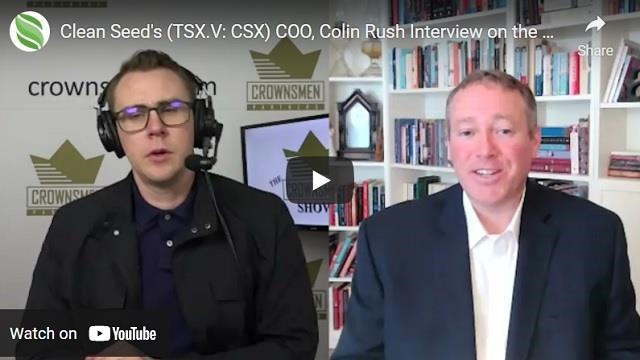Chief Operating Officer Colin M. Rush, from Clean Seed Agricultural Technologies on The Crownsmen Show for a deep dive into the company’s incredible SMART SEEDER MAX, the multi generation story beyond the company, their leadership team, and the challenges of bringing game changing innovation to the agriculture sector.

"Clean Seed Capital, https://www.cleanseedcapital.com/, is a Canadian pioneer of agricultural technologies and is creating disruptive solutions for agriculture production. They are leaders in the development and implementation of highly advanced seeding and planting platforms, powered by robust software, digital communications, new metering and ground engaging technologies. Their products set new standards in crop production which enable producers to optimize every square foot of their fields with multiple products to maximize returns.
The SMART SEEDER MAX™ high resolution delivery of seeding and planting prescriptions is beyond the limitations of current air seeding equipment. Their technology is the seeding and planting solution that can facilitate the absolute integration and realization of big data and artificial intelligence into the full cycle farming operations with a clear return on investments for farmers. The SMART Seeder™ technology will also support global food production.
Clean Seed was founded by the Lempriere family starting with their CEO and Chairman’s father Dr. Lempriere who pioneered no-tillage seeding research in the 1980’s and 1990’s and testified in front of the US Senate on Soil Conservation. This pioneer started the modern company with patents on changing the way we engage in the ground to put fertility and seeds in the furrow along with electric stepper motor metering. His son Graeme Lempriere, https://ca.linkedin.com/in/graeme-lem..., the founder of Clean Seed, continued his father’s legacy by capitalizing an R&D company to create the SMART Seeder MAX/MAX-S which is going into commercial production this year.
The company has transitioned from a small R&D agricultural technology company to an up and coming force disrupting the status quo of traditional planting and seeding technology. The company went public in 2012 and has spent time testing, securing considerable intellectual property worldwide and creating a digital planting and seeding tool unlike anything in the world. One important question is why did Clean Seed go public? Conducting advanced Agricultural Technology Research and Development is a costly and time consuming venture. In North America for the planting/seeding season it only really comes once a year for approximately 6 weeks. If you miss a seeding window you essentially can wait another 12 months for testing. The capital required to develop disruptive and game changing ag technology requires staying in for the long haul. Traditional venture capital does not usually have the patience to stay in and the major ag technology and machinery companies usually don’t want to play in the innovation ecosystem in agtech. They took Clean Seed public to access patient capital through placements easily accessed through the public markets. It allowed Clean Seed to get initial funding to grow its team, IP portfolio and now its commercial products."
Source : Clean Seed Capital